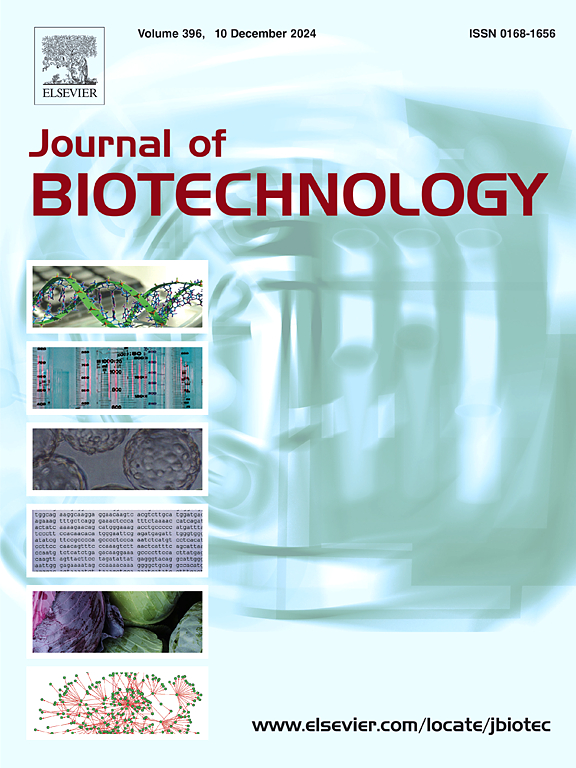Engineering and laboratory evolution of lactose-utilizing Pseudomonas putida strains
IF 3.9
2区 生物学
Q2 BIOTECHNOLOGY & APPLIED MICROBIOLOGY
引用次数: 0
Abstract
Pseudomonas putida strain KT2440 has been extensively adopted for bioengineering purposes. Despite of its versatile metabolism, this strain is not able to utilize lactose as a carbon source. In this study, we report the construction of KT2440 derivative that can utilize this disaccharide as a growth substrate. The metabolic engineering of this strain was accompanied with the laboratory evolution of bacteria on lactose minimal media. Specifically, the expression of β-galactosidase gene lacZ on a plasmid was accompanied with integration of galactose Leloir pathway genes galETKM and lactose permease gene lacY into the chromosome of KT2440. Thereafter, the engineered strain KT2440Gal was adapted on minimal medium containing lactose as an only carbon source. Three lactose-utilizing mutants were further characterized for their growth on lactose and other sugars, and mutations required to utilize lactose were confirmed by reverse engineering. This study has expanded a potential use of P. putida KT2440 in bioprocesses that are relayed on utilization of various sugars.
利用乳糖的恶臭假单胞菌菌株的工程和实验室进化。
恶臭假单胞菌菌株KT2440已被广泛应用于生物工程。尽管它具有多种代谢功能,但这种菌株不能利用乳糖作为碳源。在这项研究中,我们报道了KT2440衍生物的构建,可以利用这种双糖作为生长底物。该菌株的代谢工程伴随着细菌在乳糖培养基上的实验室进化。具体来说,在质粒上表达β-半乳糖苷酶基因lacZ的同时,将半乳糖Leloir通路基因galETKM和乳糖渗透酶基因lacY整合到KT2440染色体上。然后,将工程菌株KT2440Gal适应于以乳糖为唯一碳源的最小培养基。三个利用乳糖的突变体进一步表征了它们在乳糖和其他糖上的生长,并通过逆向工程证实了利用乳糖所需的突变体。本研究扩大了p.p . putida KT2440在利用各种糖类的生物过程中的潜在用途。
本文章由计算机程序翻译,如有差异,请以英文原文为准。
求助全文
约1分钟内获得全文
求助全文
来源期刊

Journal of biotechnology
工程技术-生物工程与应用微生物
CiteScore
8.90
自引率
2.40%
发文量
190
审稿时长
45 days
期刊介绍:
The Journal of Biotechnology has an open access mirror journal, the Journal of Biotechnology: X, sharing the same aims and scope, editorial team, submission system and rigorous peer review.
The Journal provides a medium for the rapid publication of both full-length articles and short communications on novel and innovative aspects of biotechnology. The Journal will accept papers ranging from genetic or molecular biological positions to those covering biochemical, chemical or bioprocess engineering aspects as well as computer application of new software concepts, provided that in each case the material is directly relevant to biotechnological systems. Papers presenting information of a multidisciplinary nature that would not be suitable for publication in a journal devoted to a single discipline, are particularly welcome.
 求助内容:
求助内容: 应助结果提醒方式:
应助结果提醒方式:


